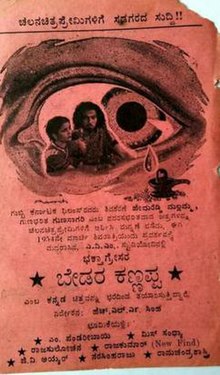| Bedara Kannappa | |
|---|---|
 Poster | |
| Kannada | ಬೇಡರ ಕಣ್ಣಪ್ಪ |
| Directed by | H. L. N. Simha |
| Written by | G. V. Iyer |
| Produced by | A. V. Meiyappan C. R. Basavaraju Gubbi Veeranna |
| Starring | Rajkumar Pandari Bai Raja Sulochana Narasimha Raju |
| Cinematography | S. Maruthi Rao |
| Edited by | K. Shankar |
| Music by | R. Sudarsanam G. Govindarajulu Naidu (additional song in Tamil version) |
Production companies | AVM Productions The Karnataka Films Ltd. |
Release date |
|
Running time | 165 minutes |
| Country | India |
| Language | Kannada |
Bedara Kannappa is a 1954 Indian Kannada-language Hindu mythological film directed by H. L. N. Simha and written by G. V. Iyer. The film stars Rajkumar playing the title character along with Pandari Bai, Kushala Kumari, G. V. Iyer, Sandhya and Narasimharaju in other prominent roles. The film is an adaptation of the stage play Kaalahasti Charitre written by T. N. Balakrishna[1] for the Gubbi Veeranna Nataka Company,[2] which was based on the folk tale of the hunter Kannappa who proves his extreme devotion to the Hindu God Shiva by gouging out both his eyes.[3]
Bedara Kannappa started as a play produced by the Gubbi Veeranna Nataka Company before it became a Kannada film.[4] The film rights of the play were later bought by A. V. Meiyappan of AVM Productions. The film's songs were composed by R. Sudarsanam, with lyrics written by S. Nanjappa. The cinematography of the film was handled by S. Maruthi Rao.[5] In 1953, Singanalluru Puttaswamaiah Muthuraj, a dramatist with Gubbi Veeranna Nataka Company was spotted by director H. L. N. Simha, who was on the lookout for well-built, pleasant-faced man for the starring role in film. Simha eventually signed Muthuraj for the film and named him Rajkumar. Filming began in mid-1953 and took over two months to complete.[6] This was the debut film of both Rajkumar and Narasimharaju as actors and of G.V. Iyer as a scriptwriter.[7]
Bedara Kannappa was released on May 7, 1954 in Bangalore's Sagar and Shivaji theatres and New Opera theatre in Mysore to low expectations.[8] The owners of New Opera theatre, thought that at best it would only run for two weeks.[4] However, defying expectations; The film was critically and commercially successful, becoming the first Kannada film to have a direct run of 365 days.[9] The film was the inaugural recipient of National Film Award for Best Feature Film in Kannada (then called the Certificate of Merit)[10] in National film awards 1954.[11] Following the film's success in Karnataka, it was dubbed and released in Tamil as Vedan Kannappa[12] with an additional song ("Aasaikkoru Aan Pillai") featuring JP Chandrababu, Rajkumar and Pandari Bai which was not there in the Kannada version.[13] G. Govindarajulu Naidu composed music for additional song in the Tamil version.[citation needed] Later, the film was remade in Telugu as Kalahasti Mahatyam also starring Rajkumar.[14] The film was also remade in Hindi in 1955 by the same director-producer duo as Shiv Bhakta.[15] It was again remade in Telugu in 1976 as Bhakta Kannappa.[14][16]
- ^ "ಕನ್ನಡ ಚಿತ್ರರಂಗ ಕಂಡ ಅಪರೂಪದ ನಟ ಬಾಲಣ್ಣನ ಸಿನಿಮಾಯಾನ | TN Balakrishna Ep 05". YouTube.
- ^ @NFAIOfficial (7 August 2023). "The star #Rajkumar appears in his first lead role in cinema as the devout hunter Kannappa in the Kannada film #BedaraKannappa (1954), directed by H. L. N. Simha" (Tweet) – via Twitter.
- ^ "Here are some must-watch iconic films of Dr Rajkumar". 24 April 2020.
- ^ a b "Bedara Kannappa 1954". The Hindu. 17 May 2008. Archived from the original on 3 November 2012.
- ^ "Dr. Raj Kumar | Gubbi Karnataka Films | Bedara Kannappa | Shabda vedhi | ನಟಸಾರ್ವಭೌಮ 'ರಾಜ್' ಐದನೇ ಪುಣ್ಯತಿಥಿ". kannada.webdunia.com. Retrieved 4 August 2022.
- ^ "ಡಾ.ರಾಜ್ ಮತ್ತು ರಂಗಗೀತೆಗಳು". Prajavani. 25 April 2021. Retrieved 4 August 2022.
- ^ "Five lesser-known facts about Kannada's Hasya Chakravarthy, Sri T.R. Narasimharaju". 24 July 2021.
- ^ Cite error: The named reference
:1was invoked but never defined (see the help page). - ^ "Did you know? 'Bedara Kannappa' was the first Kannada movie to run in theatres for 365 days and win a National Award - Times of India". The Times of India. Retrieved 26 September 2022.
- ^ Cite error: The named reference
2ndawardPDFwas invoked but never defined (see the help page). - ^ NFA Catalogue nic.in
- ^ "Rajkumar Tamil movie Songs || Vedan Kannappa Songs ||TMS". YouTube. Archived from the original on 21 December 2021.
- ^ "Aasaikkoru Aann Pillley TLN, TSB Group @ Veydan Kannnappaa". YouTube.
- ^ a b "Do you know the legendary Rajkumar once acted in a Telugu movie?". 17 September 2020.
- ^ Archived at Ghostarchive and the Wayback Machine : "Shiv Bhakta (1955) - Hum Ko Tera Naam Lene Se Waasta - Mohd.Rafi". YouTube.
- ^ "Bhakta Kannappa (1976) - Retrospective | telugucinema.com". Archived from the original on 8 March 2016.